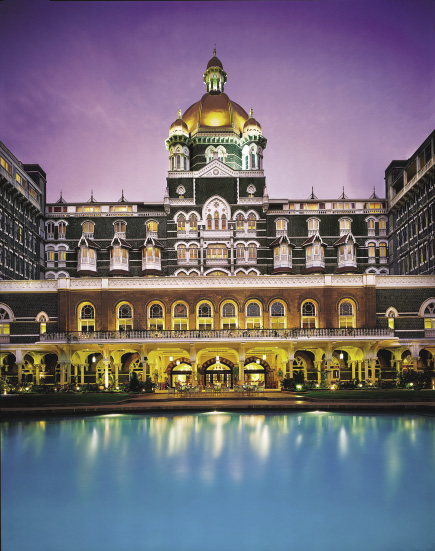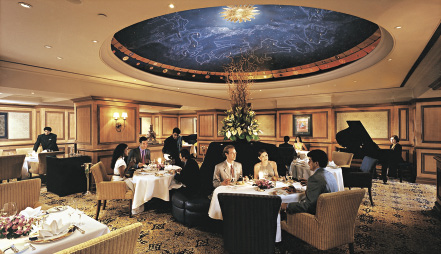- Home
- Media Kit
- Current Issue
- Past Issues
- Ad Specs-Submission
- Ad Print Settings
- Reprints (PDF)
- Photo Specifications (PDF)
- Contact Us

![]()
ONLINE

Service Culture
Editors’ Note
In 1973, Raymond Bickson began his career at the Berlin Hilton. Following worldwide managerial postings, predominantly with Regent International Hotels of Hong Kong and Monaco’s Rafael Group, he joined The Mark in New York in 1988, where he served as Vice President and General Manager until assuming his current post in 2003. Bickson studied in Berlin, Paris, Lausanne (Switzerland), and at Cornell and Harvard Universities.
Company Brief
Founded in 1903, Mumbai-based Taj Hotels Resorts and Palaces (www.tajhotels.com) is recognized as India’s largest and finest hospitality chain. Owned by the Tata Group, it consists of more than 60 properties located throughout the subcontinent, as well as in southern Asia, the Middle East, Africa, New York, Boston, and London. In addition to its luxury hotels in India – several of which are members of The Leading Hotels of the World – the group operates business hotels, palace hotels, beachfront resorts, and garden retreats.
How has Taj adjusted to the recent global economic challenges without losing its quality of service and high standards?
Taj Hotels Resorts and Palaces constantly endeavors to be world class in the realm of luxury hotels as well as to be the best in class for the other brands such as Vivanta and Gateway hotels, which is reflected in many of our guest satisfaction parameters. It has been extremely difficult since 2008 considering the recession in our source markets, terrorism in the region, high inflation, and escalation of the food price index and, therefore, tremendous pressures on cost. However, Taj has endeavored towards a zero-waste policy, instead of just cost-cutting measures, thus ensuring that there is no compromise in the quality of our guest experience.

Poolside at
The Taj Mahal Palace in Mumbai
This has also been possible because of the huge commitment of the people who work at Taj – more so at the guest interaction levels in our hotels – who have bent over backwards to please our guests. The four steps of our guest experience – warm welcome; a defect-free product and service; anticipatory service; fond farewell – have remained the hallmark of our approach towards every guest. This was substantiated by what our employees did for our guests during that fateful attack at the Taj in Mumbai in November 2008.
With a broad range of properties around the world, is it important to have somewhat of a consistent feel throughout or is it tailored specifically to individual markets?
In our brand architecture exercise, each brand has been crafted in a manner such that there is a distinct experience for the brand across locations in the product offering, service, look and feel, and overall customer journey. The aim has been to create brand standards in each brand that deliver a consistent experience for the customer, irrespective of the location of the hotel. But we also believe in giving enough space for the hotel to draw from the local nuances and/or the specific requirements of the hotel, to meet customer expectations based on the predominant customer segment.

The Zodiac Grill at
The Taj Mahal Palace in Mumbai
How much of an emphasis has the spa/fitness component of the business been for Taj and do you need to offer that to the luxury market today?
A distinguishing spa concept is the USP of any hotel brand across the world. In 2003, we conceptualized our own in-house brand, Jiva. Being an Indian Hotel company in a land rich in culture and tradition as well as the bedrock of Asian healing traditions, we decided to capitalize on an untapped market idea.
In the past decade, a new generation of spa-goers has arisen. Due to the increase in stress, both emotional and physical, the physically conscious person uses restorative techniques to improve his lifestyle. Given this, it is very important for us to offer a wholesome luxury experience to the global traveler who expects a superior spa experience in a luxury hotel.
Thus, Jiva is unparalleled in the global spa industry. This award-winning spa brand not only offers unique Indian spa treatments, but all of our oils and blends are made of handpicked organic ingredients especially created for Jiva from a botanical source, are free from parabens and petrochemicals, and are not tested on animals.
What makes this brand so successful at attracting and retaining top talent?
Throughout its 108-year work history, Taj Hotels Resorts and Palaces has developed a unique brand of service, which stands apart from other hotel chains. The service culture of the organization requires commitment to the guest’s implicit needs and to ensuring delight in every possible moment of guest contact. Driven by the vision of its founder, the late J N Tata, the Taj brand has evolved as a preferred place to work with its focus on high-end hotelier skills, space for innovation, and a climate of openness, empowerment, and ethical business practice.
The people philosophy is derived from organizational values and promotes meritocracy in a work environment of trust, fairness, and teamwork. Customized selection processes that assess attitude and values, besides technical proficiency, ensure the right hiring – a cultural and value-fit along with professional expertise. An in-depth orientation system follows, branded TAP-ME – Taj Aculturization Program for Managerial Excellence – ensuring that the individual is blended effectively into the organizational culture. A host of reward and recognition programs, including the Hermes award-winning STARS program, reinforce positive behavior and display of talent at every step. The performance management system based on the principles of the balanced score card ensures alignment of every individual’s efforts to the organization’s strategic objectives and is deployed for all levels, from top management to frontline staff. The compensation system of the organization is primarily aligned with rewarding high performance but with added weight given to commitment to organizational values, code of conduct, and work ethic.
A highly engaged workforce is one of the organization’s strengths and efforts are made to consistently enhance engagement levels. In this respect, the Year of the Associate program, which was launched in 2008, has been acclaimed as a global best practice in the hospitality industry. The engagement levels in the organization are best in class and the highest in its segment in the country and in the Asia-Pacific region. Taj has been awarded the Gallup Great Work Place Award twice, identifying it as one of the world’s 25 most highly engaged organizations.
As you look to 2012, what are you focused on to retain your leadership position?
Despite global economic turbulence, we have to maintain our growth agenda both in India and overseas. We need to consolidate our brands into the new architecture, namely Taj, Vivanta by Taj, The Gateway Hotel, and Ginger.
It is also important to focus on digital marketing and new channels of connecting with the consumers and, of course, enhancing service experience across all hotels.•